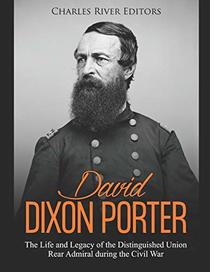David came from a very long line of exemplary naval men and he was a bit cocky about his status. Others saw David as a 'born fighter,' who was born for war. David had an incredible range of naval jobs during his life. When his father, Commodore Porter left the US Navy and accepted command of the Mexican Navy, David went along as a midshipman. While under the Mexican flag, David saw considerable action. In one instance, he and his cousin, David Henry Porter were on the same ship. His cousin was killed, and David was injured. He was taken to Havana as a war prisoner. After that, the Commodore wanted David to return to the US Navy.
In 1848, David's younger daughter died. In 1855, both David and his older daughter were gravely ill. David was in bed for 6 months, but his daughter died. Later, Porter was part of a project to try using camels in the US.* Just as David was going to leave the Navy, the Civil War began. He was assigned to take and hold New Orleans, which was the largest city in the Confederacy. By taking the city, the Union could cut off supplies to the troops and citizens. Both David Porter and his foster brother, David Farragut, saw considerable action.
Then, the Union ships moved up to Vicksburg, hoping to split the Confederacy. However, it was a more difficult job. David was promoted to Rear Admiral. He was called on to assist General Ulysses S Grant, in Grant's efforts to take Vicksburg. The story of how Grant, Sherman, and Porter achieved their aim is rousing. At the end of the battle, the temporary rank of Rear Admiral was made permanent.
After the Civil War, Porter was named Superintendent of the Naval Academy. He revolutionized the buildings, training, and curriculum. In 1866, he was promoted to vice admiral. When his foster brother, Admiral David G. Farragut died in 1870, it was expected that Porter would fill his place. He was named admiral in 1871 (the second person to achieve that position) and spent the last 20 years of his life writing. He is buried at Arlington Cemetery.
*If you get an opportunity to read it, Charles Rivers offers that unique story, THE UNITED STATES CAMEL CORPS: THE HISTORY OF THE US ARMY'S USE OF CAMELS IN THE SOUTHWEST DURING THE 19TH CENTURY. I really enjoyed it.
In 1848, David's younger daughter died. In 1855, both David and his older daughter were gravely ill. David was in bed for 6 months, but his daughter died. Later, Porter was part of a project to try using camels in the US.* Just as David was going to leave the Navy, the Civil War began. He was assigned to take and hold New Orleans, which was the largest city in the Confederacy. By taking the city, the Union could cut off supplies to the troops and citizens. Both David Porter and his foster brother, David Farragut, saw considerable action.
Then, the Union ships moved up to Vicksburg, hoping to split the Confederacy. However, it was a more difficult job. David was promoted to Rear Admiral. He was called on to assist General Ulysses S Grant, in Grant's efforts to take Vicksburg. The story of how Grant, Sherman, and Porter achieved their aim is rousing. At the end of the battle, the temporary rank of Rear Admiral was made permanent.
After the Civil War, Porter was named Superintendent of the Naval Academy. He revolutionized the buildings, training, and curriculum. In 1866, he was promoted to vice admiral. When his foster brother, Admiral David G. Farragut died in 1870, it was expected that Porter would fill his place. He was named admiral in 1871 (the second person to achieve that position) and spent the last 20 years of his life writing. He is buried at Arlington Cemetery.
*If you get an opportunity to read it, Charles Rivers offers that unique story, THE UNITED STATES CAMEL CORPS: THE HISTORY OF THE US ARMY'S USE OF CAMELS IN THE SOUTHWEST DURING THE 19TH CENTURY. I really enjoyed it.




